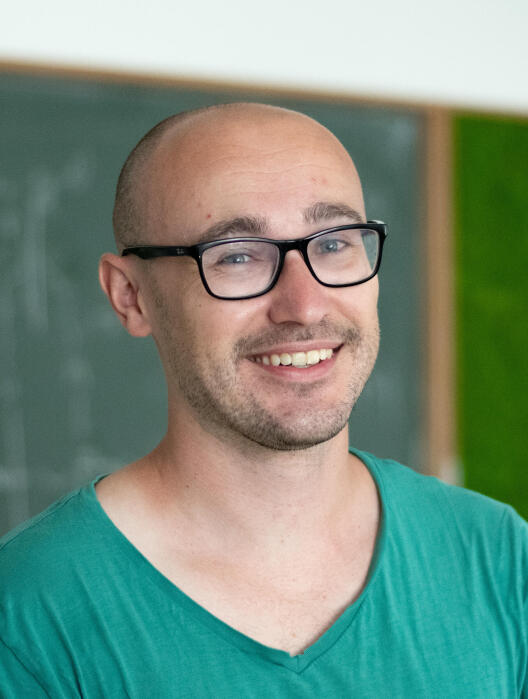Leonard Kreutz receives Emmy Noether funding

The German Research Foundation (DFG) is providing around 1.2 million euros of funding for mathematician Dr. Leonard Kreutz under the Emmy Noether Programme. Leonard Kreutz – who has been working at the Institute of Analysis and Numerics for the past four years – will use the money to set up his own research group at the Technical University (TU) Munich to work on "Variational Methods in Materials Sciences". "I am delighted that I can focus on research completely in the next few years," says the 32-year-old mathematician.
He benefited greatly from the time spent as a postdoc at Mathematics Münster: "I had the opportunity here to grow as a researcher. I was able to work independently and pursue my own ideas. At the same time, I was always involved in fruitful exchanges with other researchers, for example with my supervisor Manuel Friedrich and other postdocs such as Konstantinos Zemas." In this way he developed his own research profile, which is an important requirement for being successful in the Emmy Noether Programme. The conferences he attended in this time and the two schools for junior researchers which he co-organised were formative events. "Several projects started as a result of the contacts I made there," says Leonard Kreutz, looking back.
With his future research group, which will consist of two postdocs and a PhD, he plans to study discrete and continuous models arising from materials science in a variational framework. "The project purpose is to derive effective theories for thin materials starting from discrete models, investigate the competition between bulk and surface energies, and advance the approach of molecular mechanics in a rigorous way", he explains. The problems will be investigated using advanced tools from the calculus of variations including gamma convergence and quantitative geometric rigidity estimates, techniques from free discontinuity problems and geometric measure theory, as well as discrete mathematics.
"The funding approval by the DFG gives me a lot of self-confidence because it confirms for me that my work equates to a high scientific level," says Kreutz. He is looking forward to the new challenge of being responsible for a group of young researchers. "I really want to show the people providing the funding that they were right to place their trust in me."
Both family reasons – Kreutz comes from the Munich region – and professional reasons were decisive in choosing Munich as a location. "Strategically, Munich is a good place for me," he says, "with Manual Friedrich, who is now professor at Erlangen, as well as close cooperation partners at the University of Augsburg." Before he starts his work there, he will be spending a year abroad: since September 1 he has been teaching and researching at the Center for Nonlinear Analysis at Carnegie Mellon University (CMU) in Pittsburgh, USA.
About Leonard Kreutz:
Dr. Leonard Constantin Kreutz, born in 1990, specialises in the calculus of variations, which is used in materials science. From 2018 until August 2022 he was a postdoc in the Calculus of Variations working group at Münster University’s Institute of Analysis and Numerics. He took his first degree at TU Munich, where he took part in the TopMath elite study programme while taking his master’s degree, and where he also gained initial experience in research work. He subsequently obtained his PhD under Prof. Andrea Braides at the Gran Sasso Science Institute in Italy. After that he spent a year as a postdoc at the University of Vienna before moving to Münster in 2018. In 2019 he took up a deputy professorship for mathematical modelling at TU Munich. This is where, from 2023, he will be setting up his research group, funded by the Emmy Noether Programme, after his stay at Carnegie Mellon University (CMU) in Pittsburgh.
About the Emmy Noether Programme:
With the Emmy Noether Programme, the German Research Foundation (DFG) aims to offer scientific independence to outstanding junior researchers and, over a period of six years, thus qualify them to become university professors.
Links:
Personal webpage Dr. Leonard Kreutz
Emmy Noether Programme

